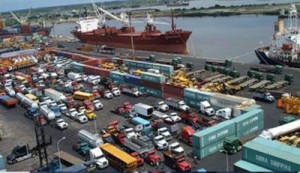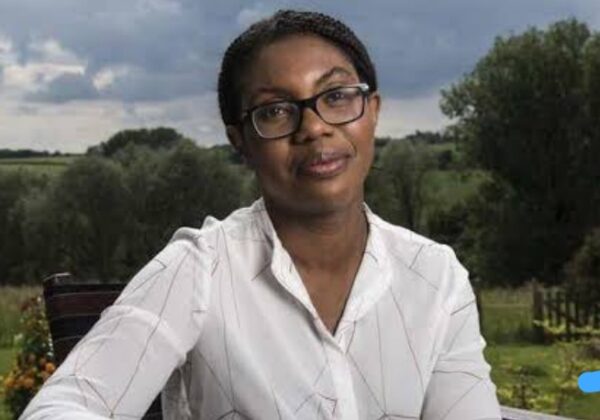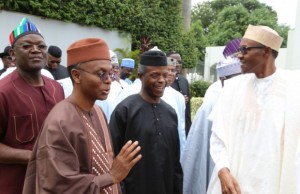Setting Agenda For Individuals And Organisations In Maritime

With the advent of a new year, John Iwori throws the spotlight on individuals and organisations that stakeholders in the maritime sector need to watch closely in 2016.
With the persistent decline in the price of crude oil at the international market, Nigeria is seeking alternative sources of income to boost its revenue. One of the areas the federal government is looking to in this regard is the maritime industry.
As such the present Minister of Transport, Right Hon. Chibuike Rotimi Amaechi is one of the individuals to watch in the maritime industry. This is due to the fact that he will be the key driver of how to make the maritime industry an alternative source of income for the government. Amaechi is a not a neophyte in government. He has spent nearly two decades in government. At various times in his political career, he was Speaker of the Rivers State House of Assembly and governor of oil and gas rich Rivers State for eight years. To say the least, Amaechi knows how government works.
Though the former governor cannot be described as a maritime expert, those who we spoke to said he has Buhari’s ears on the need to speedily deliver on the campaign promises of the retired military officer in the sector. He has the experience and exposure to deliver on the charge given to him by the president. Besides, he has a lot of aides and the bureaucrats in the ministry to guide him. A lot is expected from Amaechi in the implementation of policies and programmes, particularly in the 24 hours cargo clearance in the nation’s seaports, returning Nigeria to category C in the Governing Council of the global maritime watchdog, the International Maritime Organisation (IMO), privatisation of the major airports, as well as the rehabilitation of railway lines across the country.
The enormous roles and responsibilities placed on the former governor shoulders make it imperative for those interested in the maritime industry to watch him closely this New Year. In the same vein, the Ministry of Transport has several parasatals under its supervision. These include: the Maritime Academy of Nigeria (MAN), Oron, Akwa Ibom State; Nigerian Maritime Administration and Safety Agency (NIMASA); and the National Inland Waterways Authority (NIWA) which has its corporate headquarters in the Kogi State capital, Lokoja. Others are: the Nigerian Ports Authority (NPA), Nigerian Shippers Council (NSC), as well as the Nigerian Institute of Transport Technology, (NIIT) Zaria, Kaduna State. Series of appointments would be announced this year for some of these parasatals.
Lagos Ports Complex
The Lagos Ports Complex (LPC), Apapa is unique in so many ways. Besides the fact that it has Apapa Quay, the nation’s premier port, it is also home to other terminals, including ENL Consortium Limited and Apapa Container Terminal (ACT), the largest container terminal in Africa. According to the statistics of the Customs High Command, the LPC generates billions of naira as revenue on import duty into the coffers of the federal government annually. Though the day-to-day running of these terminals is no longer in the hands of NPA as a result of the ports reforms programme during Chief Olusegun Obasanjo’s administration, the federal government remains the landlord.
Against the backdrop of the insecurity posed by the Islamist sect fundamentalists, Boko Haram, LPC remains one of the institutions to watch in 2016. In the same vein, the Port Manager of LPC, Mrs. Eunice Ezeoke is also one of the individuals to watch this year as she superintends the affairs of the complex in the months ahead. This is so because the onus of managing the huge multibillion naira complex rests on her shoulders. It therefore remains the lot of Ezeoke and other security operatives to checkmate the activities of criminals and their collaborators in LPC.
Habib Abdullahi
The Managing Director of NPA, Alhaji Habib Abdullahi remains one of the individuals to watch in the maritime industry in 2016. The appointment of Abdullahi by former President Goodluck Jonathan, removal and reinstatement a few months later by President Muhammadu Buhari makes him the cynosure of all eyes. In the history of money spinning government agency and in the maritime industry, no one else has enjoyed that rare privilege of a sack and reinstatement within a year.
As the helmsman of the nation’s gateway, a lot is expected from him. In his maiden visit to NPA House, the corporate headquarters of the authority at Marina, Lagos, Amaechi gave a marching order to Abdullahi and his management team to attain 48 hours cargo clearance in the nation’s seaport. Many stakeholders in the maritime industry will like to see whether this is another mere playing to the gallery directive or a reality this year.
It is on record that port users, particularly importers and licensed customs agents have faulted the agreement signed between the concessionaires and the federal government through NPA. They specifically decried a situation where the federal government looks the other way while the private terminal operators engage in endless arbitrary increase in their services. They alleged that there are some cases where the concessionaires even charge for services they did not render. This has given credence to the strident clamour for the passage of the much awaited Port and Habour Bill, which has been in the National Assembly for over a decade. Abdulllahi is expected to lead the way in the passage of this bill into law as its non-passage over the years had robbed Nigeria of huge benefits.
Haruna Jauro
The acting Director General of NIMASA, Mr. Haruna Jauro is another individual to watch in the maritime sector of the economy in 2016. His appointment followed the removal of Dr. Ziakede Patrick Akpobolokemi by President Buhari. He is expected to lead the way in the execution of the statutory roles and responsibilities of the agency as enshrined in NIMASA Act 2007. Jauro, who was until his appointment, the executive director, Finance and Administration, is expected to steer the ship of the agency from the several allegations of embezzlement of funds from several quarters. Already, Akpobolokemi and some to management staff of the agency have been charged to court over some of the ills that were allegedly committed under his watch.
Whether Jauro will also have his day in court remains to be seen in the months ahead. Already, Amaechi had ordered a financial and personnel of audit of the agency. Not a few stakeholders are waiting to see the outcome of the audit. This is against the backdrop of the allegations that some of the workers in the agency were appointed or given positions that they do not have the requisite qualifications, experience and exposure in line with the laid down rules and regulations in the civil service.
One of the reasons why Jauro and the agency must be watched closely this year is the fact that there are many issues that will make or mar him in 2016. Besides, the disbursement of the long awaited Cabotage Vessel Finance Fund (CVFF), building of Nigeria’s first Maritime University (NMU), Okerenkoko, Warri South Local Government Area, Delta State, Technical College, Okoloba, Satellite and Monitoring System, NIMASA Shipyard, Institute of Maritime Studies (IMS), Nigerian Seafarer Development Programme (NSDP); among other issues will also put Jauro and NIMASA in the limelight this year.
INTELS
The name Integrated Logistics Services Limited (INTELS) is very common to many in several sectors of the economy. Nevertheless, its foray into the maritime sector of the economy, as well as the oil gas industry stands it out. The company is the concessionaire of Onne, Calabar and Warri ports following the conclusion of the concession programme of the federal government in 2006.
Those who have visited Onne Port Complex, Federal Ocean Terminal, and the Federal Light Terminals were convinced that the management of the firm has matched words with action in its drive to ensure the sustainable development of its core area of business. Managing Director of INTELS, Mr. Simone Volpi stated that it makes sense to use the income in the oil and gas industry to invest heavily in the agricultural sector of the economy for the benefit of Nigeria, nay Nigerians.
Apart from maritime, INTELS has been spearheading efforts to make Onne port a hub for the oil and gas industry. The company strongly believes that firms doing business in the oil and gas industry must concentrate on their core services while outsourcing peripheral activities to it. This is due to the fact that it has state of the art office and residential accommodation facilities besides catering and health services in Onne. This has made it possible for firms to quickly settle down to do the business that brought them to Nigeria in the first place. Till date, only very few companies have been able to attain this feat as many grapple with the challenges common to doing business in Nigeria.
For the past four years, the company has been organising the annual oil and gas forum which has become a rallying point for the key players in the oil and gas industry and beyond. The forum is fully supported by the federal government with the Ministries of Trade and Investment, Transport, and Petroleum Resources participating actively. The 2016 edition promises to be better with more sponsors, exhibitors, and players participating. For these and many more, INTELS remains one of the firms to watch this year
Slok Shipping Limited
There are many shipping firms in the country. While some are owned by Nigerians, others are owned by foreigners. However, it is rare to find a brand new ship wholly owned by Nigerians in the Nigerian territorial waters and beyond because of the cost implications. It does not only take a lot of resources to own a vessel but also much more to maintain it and make it ready to undertake any job anywhere on the globe. The ship owner must not only ensure bunkering but equally render his obligations to the crew on board wherever they are. Indeed, the enormous resources involved, besides the technicality and complexity of running a shipping firm is not for the lily livered. These are the reasons why most of the vessels owned by Nigerians are either old or used ones popularly called tokunbo in the local parlance.
However, the management of Slok Shipping Limited owned by the former Governor of Abia State, Chief Orji Uzor Kalu has changed the story. The firm was top on the list of the firms that have been acquiring brand new vessels in the last six years.
Checks revealed that the firm has continued to procure new vessels from Malaysia, Singapore and elsewhere. The former governor has succeeded in telling a successful story that some Nigerians have what it takes to compete with their foreign counterparts in the shipping world. Some of the vessels procured by Slok Shipping include a platform supply vessel (PSV). The ships were built by NGS Tech Shipyard, Malaysia.
Apart from making a loud statement that its entry into the maritime industry about a decade ago was not a fluke, reports have revealed that Kalu’s decision to place order for eight new vessels at a time was meant to intimidate his competitors and announce his foray into the highly risky but very lucrative shipping sector of the economy with a bang. For its bold initiatives and aggressive drive in the maritime industry, among other things, Slok Shipping Limited remains one of the companies to watch in 2016.
Port Notel Ocean Terminal
Port Notel Ocean Terminal, which has Mr. Victor Akpanika as its managing director is one of the firms to watch in the maritime industry this year. It is a private initiative project being promoted by a Port Harcourt, Rivers State based firm, Port Notel Limited. The terminal is located in Ibeno Local Government Area, Akwa Ibom State.
The promoters of the project are private investors who are desirous of developing an ocean terminal by avoiding the pitfalls that are associated with government projects. The building of the deep seaport involves many private investors within and outside the country. The promoters are partnering other key stakeholders as strategic investors and major off-taker of the services of the project when fully developed.
It was gathered that the company has gone far in the processes involved. These include sourcing for funds towards preliminary market viability study and environmental impact assessment study (PEIA) and other critical studies on the project estimated to cost not less than $1 million.
Further investigations revealed that a maritime firm based in Europe, Royal Haskoning Group has been commissioned to carry out the market viability studies. It was learnt that the choice of the firm was based on their global network, expertise, and the fact that they were engaged by the World Bank to undertake a comprehensive technical and financial study of Nigerian port sector. While Fugro Nigeria Limited and AvantGuard Security Solutions, United Kingdom have also been contacted to handle the PEIA and ports security studies respectively.
Among other things, these reports are the basic requirement by the Federal Ministry of Transport to grant approval for a deep seaport operating license.
Giving an insight into how far the promoters have gone in their quest to execute the project, Akpanika had said: “We have been issued with a no objection letter by NPA to carry out these studies and detailed technical feasibility studies. We have been trying to network through local and international donor agencies to access grants, and financial aids assistance to fund the studies”.
He disclosed that the firm will take a final investment decision (FID) in 2016 besides the involvement of more terminal operators, just as more investors, especially shipping firms have indicated interest to come on board.
As a private initiative coming at a time the federal government has been clamouring for the development of Greenfields following the congestion and decay in the infrastructural facilities in the existing ports situated in Lagos, Calabar, Koko, Sapele, Port Harcourt, and Warri, Port Notel Limited remains one of the organisations to watch in 2016.
Colonel Hameed Ali
The Comptroller General of Customs (CGC), Colonel Hameed Ali (rtd) is one of the individuals to watch in 2016. The retired military officer, who was the former military administrator of Kaduna State, took over the reins of administration after the former CGC, Alhaji Inde Dikko Abdullahi resigned from office in August 2015 after spending over four years in the saddle. The Nigeria Customs Service (NCS) has three statutory functions, namely, revenue collection, trade facilitation, as well as the prevention and suppression of smuggling.
Following the directive of President Buhari that all revenue generating government agencies should be probed from 2012 to 2015, the searchlight shall be on Ali and NCS in the months ahead. Ali was quoted as saying in his first public outing shortly after resuming office that corrupt Customs officer “will not go scot-free”. Continuing, he said: “The minimum jail term for corrupt officers is five years, but I will make sure that any officer found to be corrupt gets the maximum jail term of 10 years.”
In spite of Ali’s promise to jail any NCS personnel caught taking bribe, that has not yielded the desired results as reports of officers collecting bribe before carrying out their roles and responsibilities are still rife.
The promise to jail erring officers aside, Ali should eliminate human contact which in most cases gives room for the collection of bribe. He must ensure that the scanners in the seaports, airports and international land borders which cost the federal government billions of naira to procure through three scanner service providers (SSPs) work properly. He should put in place the single window system, which some less endowed countries in Africa, are already using to clear goods in their seaports. How he carries out the reforms and revenue generation mandate given to him by Buhari makes Ali one of the individuals to watch in 2016.
MAN, Oron
There are many maritime training institutions in Nigeria. However, MAN, Oron remains the only the International Maritime Organisation (IMO) recognised maritime academy in Nigeria. Until late last year, Mr. Joshua Okpo was the Rector of MAN, Oron. Okpo, whose sudden death in Abuja raised eyebrows was a Director in the Federal Ministry of Transport prior to his appointment by former President Jonathan.
There were allegations of how much he has been given by NIMASA and how he spent the money. Already, Amaechi has directed that an audit of the premier training school should be carried out. The outcome of the report, who becomes Okpo’s successor, the reaction of the host community, Oron, acquisition of training ship, among other issues will make MAN, Oron to remain one of the organisations to watch in 2016.
Moreover, the federal government has already made its intention known on the transformation of the academy into a degree awarding institution. Whether this becomes a reality or not depends on actions and inactions of the new Rector in the months ahead. The way and manner he discharges his mandate as the helmsman of Nigeria’s oldest maritime training institution will go a long way to determine his place in history.
Senate and House Committees on Marine Transport
The Senate and the House of Representatives Committees on Marine Transport are some of the institutions to watch in the maritime industry in 2016. They stand out as the ones whose actions will have the greatest impacts on the maritime sector of the Nigerian economy.
All eyes will be on Chairman, Senate Committee on Marine Transport Senator Ahmed Sani. This is also applicable to his counterpart in the House of Representatives. There is unanimity among stakeholders in the maritime industry that these two committees remain some of the institutions to watch this year.
These committees cannot be ignored in the scheme of things in the maritime sector of the economy as their oversight functions can go a long way to affect positively or negatively the parasatals under their jurisdictions. The helmsmen of the parasatals are not only summoned to the National Assembly but also questioned on several issues, particularly on the discharge of their statutory roles and responsibilities.
When and how they submit their annual budgets and expenditures had often become a subject of legislative scrutiny. They are often grilled for not submitting their budgets on time. Again, they were also grilled many times for their revenues and expenditures. Some industry players told THISDAY that those interested in the maritime industry in 2016 must watch the activities of these committees closely.
Will these committees ensure the passage of the Port and Habour Bill and other vital bills that will help Nigeria harness her huge potentials in the maritime industry or will it continue with the old way of doing things? This is a pertinent question on the lips of critical players. Though some stakeholders have queried the way and manner the committees carry out their oversight functions, especially in the late approval of parasatals budgets, they agreed that heads of government agencies now know that they must prepare themselves thoroughly before appearing before the committees, thereby keeping them on their toes.
Source: THISDAY







